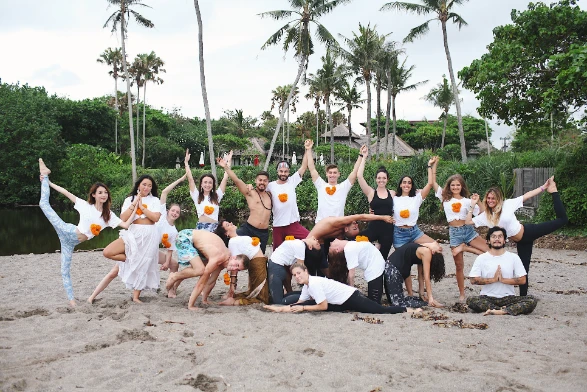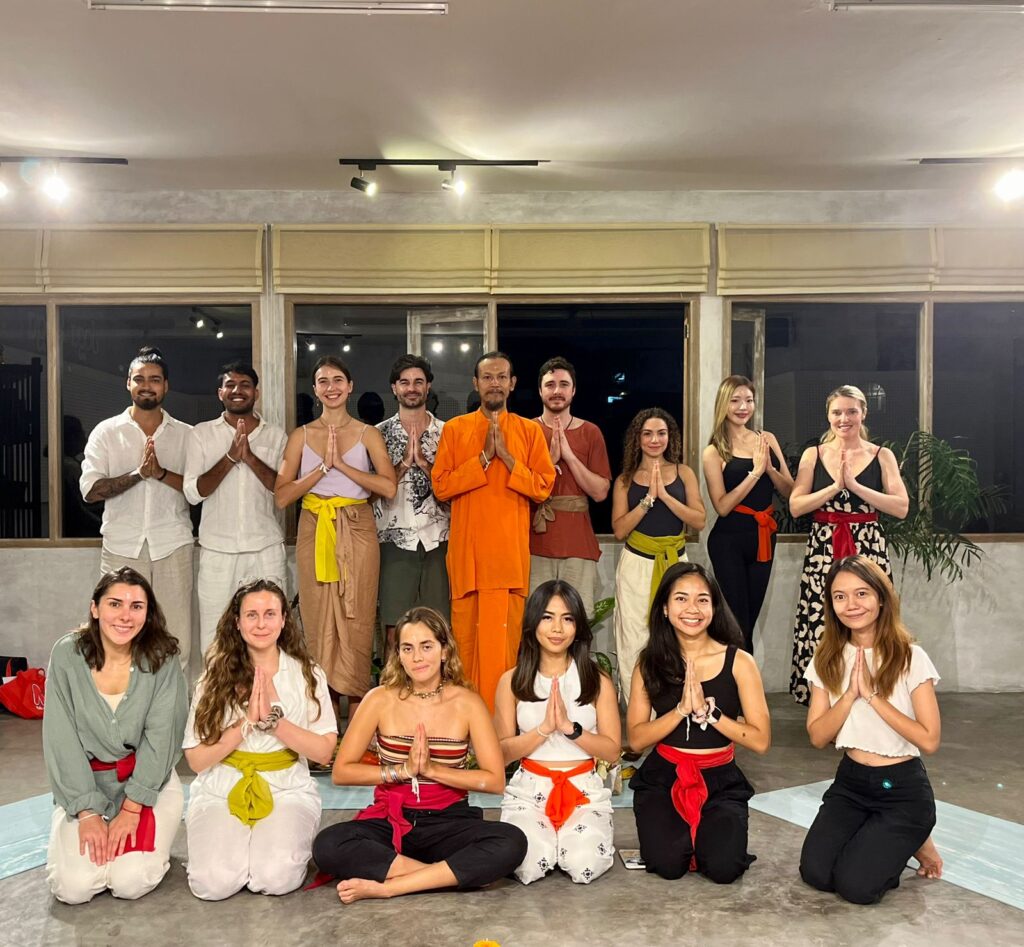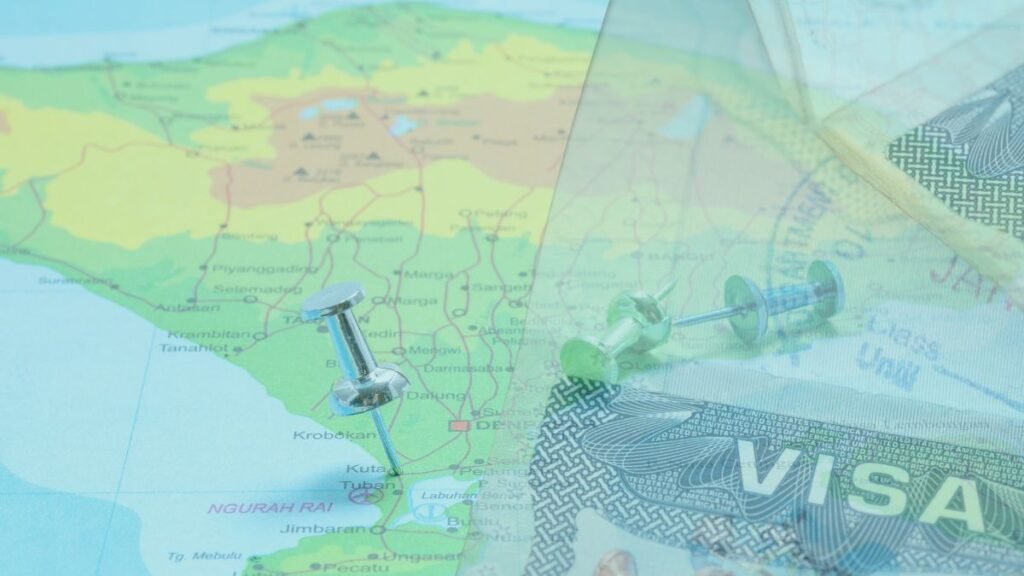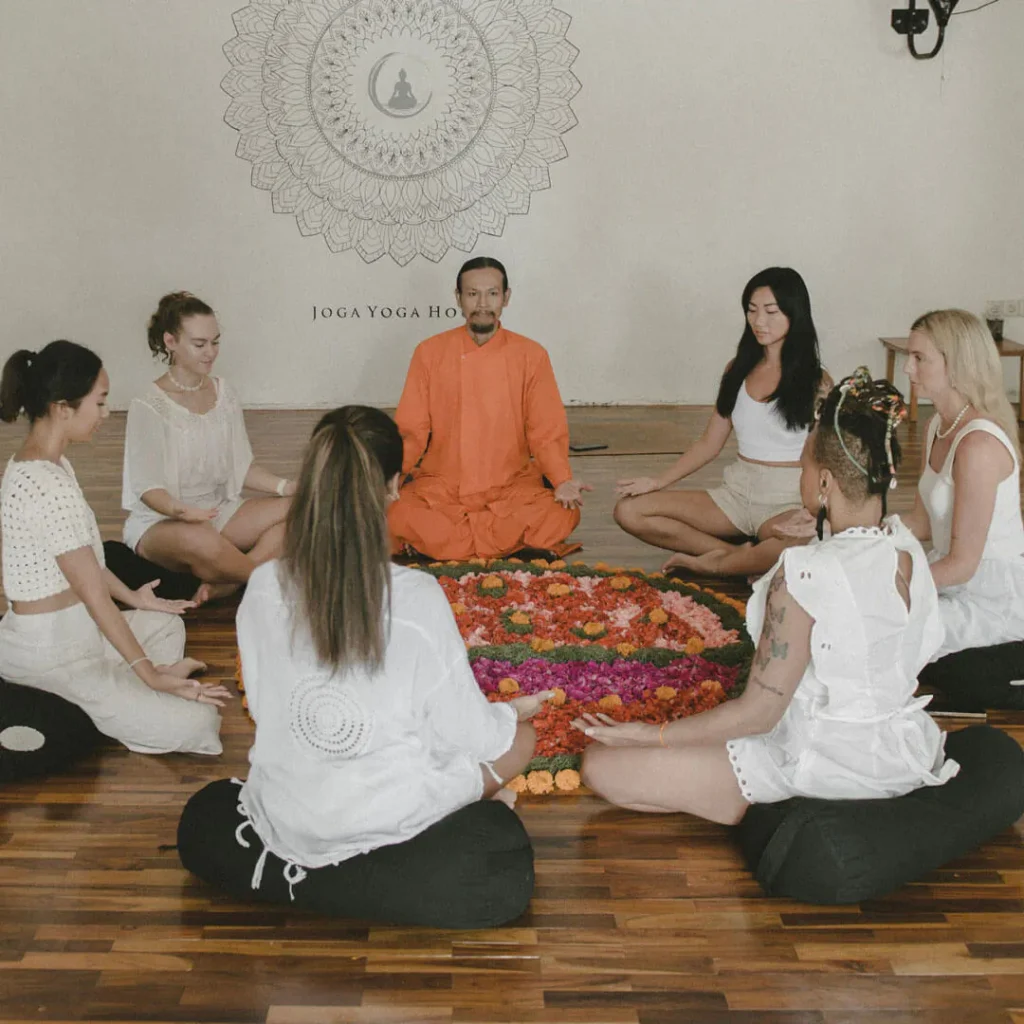Why Bali Attracts Aspiring Yoga Teachers
Bali is one of the most popular destinations in the world for yoga teacher training. The island offers a rare mix of deep spirituality, lush tropical scenery, and a thriving international yoga community. Between its ancient temples, calm beaches, and nourishing food culture, Bali creates the perfect environment to study, practice, and transform.
At Joga Yoga, you can choose between several immersive Yoga Alliance–certified programs:
- The 100-hour training (10 days) for those who want to deepen their practice or complete their certification in two parts.
- The 200-hour training (21 days) for a full foundational certification.
- The 300-hour training (29 days) for advanced teachers ready to expand their expertise.
All programs combine daily asana, pranayama, meditation, philosophy, and teaching methodology. Students live, eat, and breathe yoga from sunrise to sunset, surrounded by the peaceful energy of Canggu’s rice fields and beaches.

Why Travel Logistics and Visa Planning Matter
A smooth arrival is just as important as the training itself. If you arrive jet-lagged, confused about your visa, or stressed by logistics, it will distract from your experience. Planning your travel and visa early ensures that you can land, settle in, and start your program fully present.
Joga Yoga takes care of many details, such as airport pickup, breakfast and lunch, comfortable rooms, excursions, and community events, but visa preparation remains your responsibility. The right visa choice will save you both time and unnecessary fees later.
What You Need to Know About Bali Visa Types and Travel Regulations in 2025
Overview of Visa Options for Bali
Indonesia offers several types of visas suitable for yoga students. The main ones for short-term stays include:
- Visa on Arrival (VOA): Valid for 30 days and extendable once for another 30 days. Available for over 90 nationalities.
- Electronic Visa on Arrival (e-VOA): The same as the VOA but applied for online before arrival, allowing faster processing at the airport.
- Tourist Visa / Visit Visa (B211A): Ideal for longer stays or those planning to remain beyond 60 days. This requires online application and supporting documents, such as proof of accommodation and sufficient funds.
If you come from a country eligible for visa-free entry, note that this option allows only a 30-day stay and cannot be extended. Since most Joga Yoga programs run from 10 to 29 days, the VOA or e-VOA will cover you comfortably.
Recent 2025 Updates to Entry Rules
In 2025, Indonesia streamlined its visa system and introduced several changes relevant to students:
- The Bali Tourist Levy of IDR 150,000 (around €9) is now mandatory for all foreign visitors and must be paid before or upon arrival.
- All travelers must complete an online customs and health declaration before landing in Bali.
- Immigration has started stricter enforcement of overstays, and extension applications require biometric verification.
These updates make advance preparation essential, particularly for students staying for three to four weeks.
Choosing the Right Visa for Your Training Duration
Your visa type depends on your chosen program:
- 100-hour (10-day) course: A standard VOA or visa-free entry is sufficient for most nationalities.
- 200-hour (21-day) course: A VOA or e-VOA gives you enough time and can be extended if you plan to stay longer.
- 300-hour (29-day) course: The VOA or e-VOA works, but applying in advance for an extendable tourist visa adds peace of mind.
Always ensure your visa validity covers your program plus a few extra days for travel and recovery.
Required Travel Documents
Before departing, prepare the following documents:
- Passport valid for at least six months beyond your arrival date
- Return or onward flight ticket within your visa validity period
- Proof of accommodation, such as your Joga Yoga booking confirmation
- Proof of sufficient financial means for your stay
- Course acceptance or registration letter (useful if applying for a tourist visa)
Having these ready helps you clear immigration smoothly and focus on your upcoming training.
Visa Fees, Extensions, and Common Mistakes
The Visa on Arrival costs about IDR 500,000 (roughly €30–€35). The tourist levy is paid separately. Extensions can be processed at local immigration offices or through visa agents in Bali. Make sure you apply for extension before your first 30 days expire.
Common mistakes to avoid include:
- Entering on a visa-free entry when your stay exceeds 30 days
- Forgetting to extend your visa on time
- Overstaying your visa (fines are applied per day)
- Assuming the tourist levy is part of the visa cost
A little preparation will save you stress, money, and unwanted visits to immigration offices.
Planning Your Travel Around Your Yoga Teacher Training in Bali
When to Arrive
It is best to arrive at least one or two days before your training begins. This gives you time to recover from your flight, adjust to Bali’s tropical climate, and get familiar with your surroundings. Students who arrive early generally start the training more relaxed and focused.
What Joga Yoga Provides
Joga Yoga’s packages already include many travel essentials:
- Airport pickup directly to your accommodation in Canggu
- Daily vegan or vegetarian breakfast and lunch
- Accommodation options ranging from shared dorms to deluxe private rooms
- Cultural excursions, a Balinese massage, and optional surf lesson
- Access to sauna and cold plunge facilities
With these details handled for you, your only task is to book your flight and focus on the practice ahead.
Local Logistics: Transport, Connectivity, and Essentials
- Transport: Taxis and ride-share apps are available throughout Bali. Scooter rentals are common, but always wear a helmet and check your insurance coverage.
- SIM Cards: Buy a local SIM card at the airport or convenience stores for reliable data during your stay.
- Currency: The local currency is the Indonesian Rupiah (IDR). Bring some cash or use ATMs—cards are accepted in most areas.
- Insurance: Carry travel insurance that covers medical needs and potential activities such as surfing or hiking.
Cultural Etiquette and Tourist Rules
Respect for Balinese culture is non-negotiable. Dress modestly when visiting temples, avoid public displays of disrespect, and follow local customs. The Bali government has also reinforced visitor behavior guidelines to protect local traditions.
The New Tourist Levy
Since 2024, all international visitors must pay a tourist levy of IDR 150,000, used to support environmental and cultural preservation. Payment can be made online before you fly or upon arrival at Ngurah Rai International Airport. Keep proof of payment on hand in case it is requested.
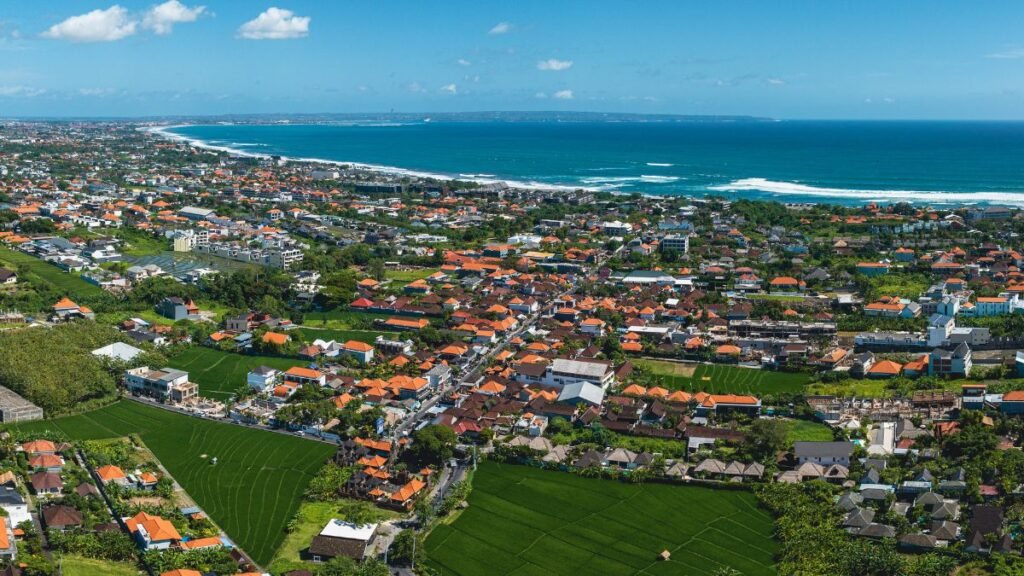
Visa and Training Duration Matched to Your Program
100-Hour Yoga Teacher Training (10 Days)
If you’re attending the 100-hour Yoga Teacher Training, your stay in Bali will be brief, usually 10 to 12 days including arrival and departure. Most students join this program on a Visa on Arrival (VOA) or visa-free entry (if your nationality allows).
The VOA is valid for 30 days from the date you land in Indonesia, which comfortably covers your course and some personal exploration afterward. It’s simple, fast, and available at Ngurah Rai International Airport in Denpasar or online through the e-VOA portal before departure.
Tip: If your flight schedules make your total stay slightly longer than 30 days, apply for the e-VOA so you can easily extend it once in Bali.
200-Hour Yoga Teacher Training (21 Days)
The 200-hour program runs for 21 days, making the VOA still the most suitable option for most students. It gives you extra days to arrive early and stay after graduation.
What to watch for:
- The VOA counts the day you land as day one. If you stay even one day over 30, it is technically an overstay and fines apply.
- If you think you may want to stay beyond the program such as for travel, rest, or teaching practice, plan for a visa extension in advance.
- You can extend a VOA once for another 30 days at an immigration office in Bali (Canggu, Denpasar, or Jimbaran). The process typically takes about a week, during which your passport will be held for stamping.
Tip: If you prefer not to handle extensions yourself, you can hire a local visa agent in Canggu to manage it for a small service fee.
300-Hour Yoga Teacher Training (29 Days)
This course lasts almost a full month, so timing and visa validity are more critical. A VOA will cover exactly 30 days, including the day you arrive. However, any flight delays or post-course rest days could technically exceed that limit.
For this reason, many advanced trainees opt for an e-VOA or Tourist Visit Visa (B211A). The B211A is valid for 60 days and can be extended twice, giving you up to 180 days in Indonesia, ideal if you plan to stay longer to explore or teach.
Tip: Apply for the B211A before traveling if you expect to stay over 30 days. It requires uploading your passport, a return ticket, and accommodation proof, but approval is usually quick (about 5–7 days).
Staying Beyond the Course Duration
If you remain in Bali after graduation; for example, to take advantage of Joga Yoga’s post-training teaching practice opportunities, ensure your visa still covers your stay.
- For short extensions (a few extra days), extend your VOA before the 30-day limit.
- For long-term teaching or residency, you’ll need a different visa type such as the KITAS (temporary residence permit) or cultural exchange visa, depending on your teaching arrangement.
Overstaying your visa results in daily fines and can affect future entries into Indonesia, so plan your timeline carefully before booking flights.
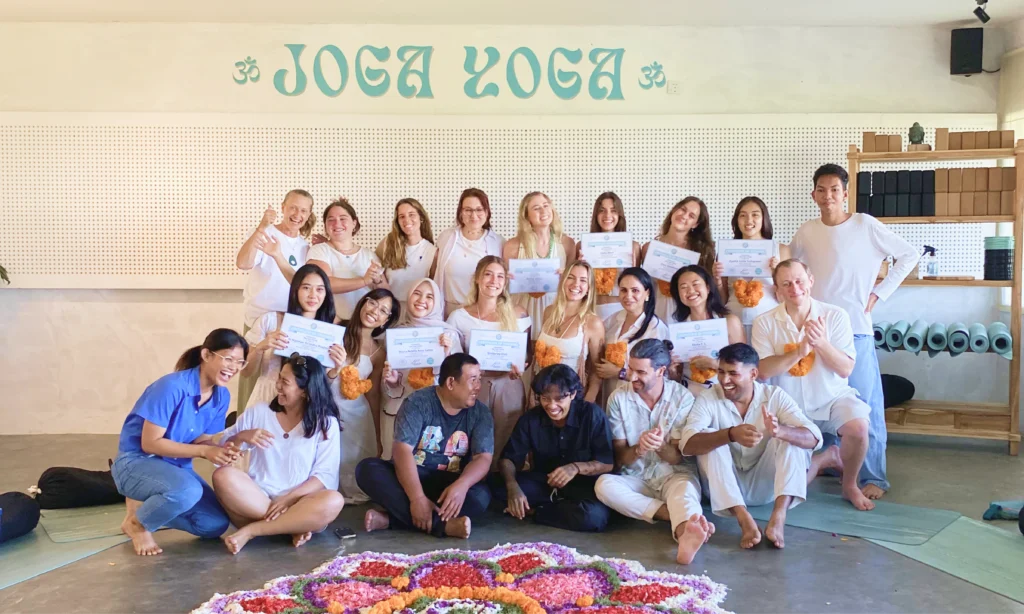
Tips to Avoid Visa and Travel Mistakes
Common Mistakes Students Make
Experienced yoga travelers in Bali report that most visa issues happen because of simple misunderstandings. The most common mistakes include:
- Choosing the wrong visa type for your stay length.
- Forgetting that the entry date counts as day one of your visa.
- Failing to extend the VOA on time (you must apply before it expires).
- Overstaying, which leads to fines of IDR 1,000,000 per day.
- Missing documents at immigration, such as return flight proof or passport copies.
Preparation and awareness are the easiest ways to avoid these problems.
Pre-Travel Checklist for a Smooth Arrival
Before you leave home, double-check these essentials:
- Passport valid for at least six months from your entry date.
- Return or onward flight ticket within visa validity.
- Joga Yoga confirmation letter and accommodation details.
- Printed or digital proof of visa payment (VOA or e-VOA).
- Proof of sufficient funds or credit card (rarely requested, but useful).
- Travel insurance covering health and activities.
Having physical and digital copies of these items helps if your airline or immigration requests them.
Extending Your Stay in Bali
If you plan to stay beyond 30 days, begin your extension request about 10 days before your visa expires. You can do this yourself at a local immigration office or hire a registered visa agent near Canggu to handle it.
Steps usually include:
- Submitting your passport and visa extension form.
- Paying the extension fee (around IDR 500,000–600,000).
- Returning for biometrics (photo and fingerprints).
- Collecting your passport with the new validity stamp.
The entire process takes five to seven working days. Keep digital copies of your passport during this time for ID purposes.
When and How to Exit Indonesia
If your visa is ending and you don’t plan to extend, you must leave Indonesia before it expires. Departure day counts as part of your visa period.
If you plan to re-enter later, such as for another training or retreat, you can apply for a new visa from your home country or another nearby destination (Singapore and Kuala Lumpur are common re-entry points).
Post-Training Stay and Teaching Practice in Bali
Staying After Graduation
Joga Yoga graduates often choose to stay a bit longer in Bali to rest, surf, explore, or join community classes. If you stay only an extra week or two, an extended VOA will suffice. For longer stays, switch to a Visit Visa (B211A) before your VOA expires.
Long-Term Options for Teaching in Bali
If you intend to stay and teach yoga in Bali for an extended period, there are a few legal pathways:
- KITAS (Temporary Residence Permit): Allows long-term stay for work or volunteering. You’ll need a local sponsor or employer.
- Cultural or Social Visa: For those volunteering or engaging in non-commercial yoga teaching.
- Digital Nomad / Remote Worker Visa: Recently introduced for people earning income abroad but residing in Indonesia.
Each option requires documentation, sponsor letters, and sometimes a work permit, so plan early if you see yourself teaching long-term.
How Joga Yoga Supports Graduates
Joga Yoga offers continued support even after your course ends. Graduates gain post-training teaching opportunities at the on-site studio in Canggu and access to a lifetime online student portal. If you’re considering staying longer, the school can help with local contacts and guidance on visa-friendly options for teaching or assisting.

Next Steps
Completing a yoga teacher training in Bali is more than an educational milestone, it’s a life-changing experience. The island’s unique combination of natural beauty, deep spirituality, and warm hospitality makes it the perfect backdrop for personal transformation.
However, even the most enriching journey can become stressful without proper travel and visa planning. By understanding Indonesia’s 2025 visa options and preparing early, you ensure that your focus stays where it belongs—on your growth, practice, and community.
Key takeaways for Joga Yoga students:
- The Visa on Arrival (VOA) or e-VOA covers all Joga Yoga programs from 10 to 29 days.
- Apply early and keep all required documents ready: passport, return ticket, accommodation proof, and registration confirmation.
- If you wish to stay longer for travel or teaching practice, plan your extension before your 30-day limit expires.
- For extended or professional stays, explore the B211A tourist visa or long-term options like the KITAS.
- Respect local customs and stay mindful of Bali’s new tourist levy and visitor regulations.
At Joga Yoga Bali, every program is designed to make your training seamless—from airport pickup and nourishing meals to lifetime post-graduation support. With your visa and travel details handled, you can immerse yourself fully in the experience and return home certified, confident, and transformed.


